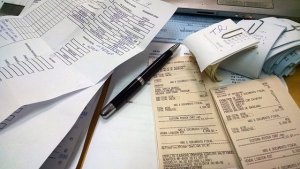Since the end of the year is drawing closer every day, The Rules of Thumb blog from MoneyThumb would like to address individuals who read our blog and discuss how long you should keep your tax records. Many of you keep your own records and don't use the services of an accountant, whose job it is to know for sure how long it is necessary for you to keep tax records. You may do your own taxes, or have a professional service handle them, but either way, you should know exactly how long to keep tax records in case something comes with the IRS down the road.
One of the main reason we are breaching this subject today is to show you an example of 'something coming up with the IRS' discussed in this article from Accounting Web. The gist of the article revolves around a new, unpublished decision handed down by the Fourth Circuit Court of Appeals, Forde, CA-4 No. 18-1584, 11/13/18, in which a taxpayer would have saved a significant amount in taxes if he could have produced records for certain home improvements. The Fourth Circuit affirmed the Tax Court’s decision without further discussion.
The ruling came about as a result of a situation with a taxpayer and his spouse who purchased a house for $835,000 in 1998. Over the next three years, they demolished the main residence and built a new one. He lived in this “guest home” while it was being renovated.
During this time, the taxpayer owned an online tutoring company that was being investigated by the Securities and Exchange Commission (SEC). He was sued by the agency for making false and misleading statements and omitting material information in securities filings.
As a result of this lawsuit, the taxpayer was in danger of losing the home and was unable to refinance his mortgage. After filing for bankruptcy, he arranged for a sale in 2002.
The contract called for a sales price of around $3.9 million. But it was later determined this was part of a mortgage fraud scheme. The supposed buyer never took possession, nor was any payments ever made to the taxpayer.
Eventually, the mortgage went into default, and civil and criminal actions were brought against the taxpayer. He was convicted in 2009 and sentenced to 42 months in prison.
The taxpayer finally filed his 2002 income tax return in 2012 – nine years late. He didn’t report any gain from the sale of the residence and claimed that his basis in the home exceeded the amount realized from the sale. But he could only provide proof of his original purchase price and a small amount for home improvements. He didn’t have any other documentary proof of the increase in basis that he claimed. The IRS used the sales price of $3.9 million to calculate the taxable capital gain.
The moral of the story for you as an individual is how important it is to keep records of home improvements and similar expenses that can reduce a taxable gain if you are ever audited.
To help you with your upcoming taxes after year's end, MoneyThumb offers you the ability to convert your bank statements to PDF form for more ease in handling your taxes. We offer a version of our PDF financial file converters especially designed for individuals, and you can take a test drive for free. Check those tools out today.





















Add comment